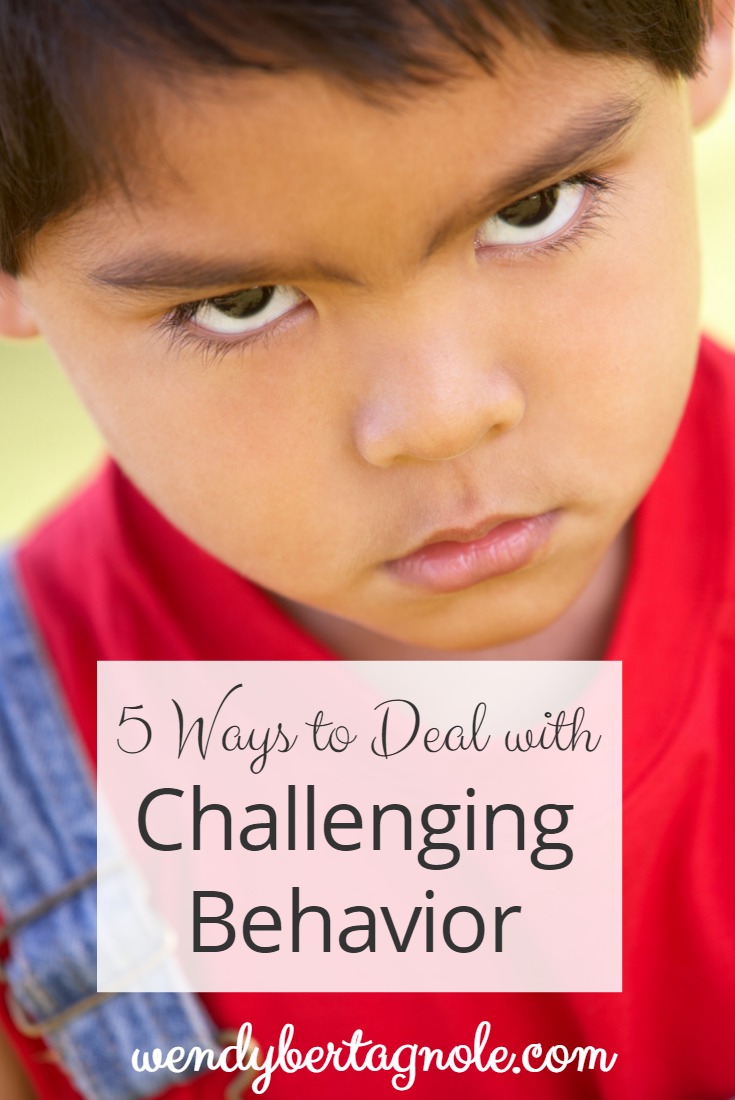My Top 5 Tips for Dealing With Challenging Behavior
After receiving a phone call from my children’s preschool director today about my son’s challenging behavior, my heart sank.
I dropped everything I was doing and went to pick him up early from school.
As I did, I went through a mental list of how I would address what he had done.
Never in my life had I been called to pick up a kid for bad behavior.
Never did I expect MY CHILD to be the one who ends up in the principals office.
But there I was, palms sweating, heart racing, ready to deal with it all like a pro.
Be sure to check out even more of my helpful parenting tips, too!
My Top 5 Tips for Dealing With Challenging Behavior
In the book The Explosive Child, Dr. Ross Greene suggests that “explosive children” (or spontaneous children, like my son) are “black and white children living in a grey world.”
He suggests that these are children who are bright, capable children who see things in a black and white way, in other words, there is only one RIGHT way to do things.
These children lack the skills necessary to change direction, see things in a different perspective, or conform to a new situation.
Problem solving, conflict resolution, and flexibility are difficult for these explosive kids.
Knowing this, he suggests that all parents strive to be proactive rather than reactive to the situation.
In other words, try not to put out each fire lit by these explosive kids, but rather teach the kids how to be more flexible, understand their frustrations, and work through the process of resolving the conflicts.
In essence, teach them the skills they lack.
I knew THAT was my goal so I made the effort to go through the following steps:
1. Breathe to Address Challenging Behavior
I was frustrated, irritated, and feeling all sorts of emotions over this simple phone call.
I allowed myself to say “its ok,” what happened has already occurred, I can’t change it.
I can only help to change future events.”
I stated that over and over in my mind until I felt the calmness in my heart which allowed me to approach the situation with a more level head.
2. Avoid Jumping to Conclusions
I jumped to a lot of conclusions in my mind, placing the blame on the teachers, my son, the director, myself. (isn’t it amazing how many thoughts can go through a person’s mind so quickly?)
I knew that blame placing and jumping to conclusions would only skew any information I was wanting to receive from my son.
I placed all that aside. What happened had already happened, it didn’t matter NOW whose fault it was.
There are always two sides to every story, the side most important is your child’s because THAT will be the only one to give clues about what skills were lacking in that situation.
3. Avoid Verbal Finger Pointing
I picked my son up from school, gave him a big hug and took him to the car before anything was said about the situation at all.
I wanted him to first feel of my love, allowing any defenses to be lowered.
Tip: Phrases such as;
- “What were you thinking?”
- “How many times have I told you…..!”
- “I’m so upset at you right now!”
- “Who do you think you are?!”
are essentially finger pointing phrases telling your child that he is bad/broken/wrong/ etc.
Those phrases place blame and shame on the child and will most likely result in your child shutting down, or becoming defensive.
Your purpose in having this conversation is to gain a clear(er) picture of your child’s thought process and discover where there was a deficiency, not to blame for the challenging behavior.
That will only occur if your child is open and candid in his thoughts.
Your job is to set the stage for that to happen.
4. Ask Open Ended Questions
Open ended questions are ones that require more than a one word answer.
Questions such as “tell me about ___”, “explain ______”, “why ______” are ones that will elicit a more lengthy response and give you the insight you need to understand your child.
So I began a conversation…
Me: “Tell me about your day at preschool”
Son: “Well there was one bad thing that happened…. Miss Casey’s car broke so she had to ride her bike all the way to preschool this morning! That was a bad thing…. Imagine if our car broke and we would have to ride a bike to preschool and it would be really cold……. that would NOT be good!”
I had to laugh, his response was NOT what I was expecting to hear from him but it told me a lot.
It told me that his mind was firing in different directions today.
His thoughts were a bit scattered.
Following directions would NOT be his strength on a day like this.
5. Dig Deeper into Challenging Behavior
We continued our conversation…
Me: “Oh wow. What else happened at preschool…did you play with a new friend?” (trying to jog his memory towards the event I wanted to hear about)
Son: “Yes,,, (sigh) We were hiding and Miss Casey said that was NOT GOOD!”
Me: “Oh! You were hiding?”
Son: ” Yah, me and Mike hid behind the bookshelf…we saw a spider!”
Me: “Oh really! what were you doing?”
Son: “Nothing…. Hey the sun is brighter now Mom!… can I have my games when I get home?”
I realized we weren’t going anywhere with that conversation, He wasn’t focusing on anything for very long. That seemed to be his brain pattern that day.
Later on I asked about the rules at preschool, wanting to make sure he understood that hiding was not ok.
He said “no hiding, no hitting, no poking, no touching, no talking….”
THERE IT IS! The problem was basically that he is a “black and white child;” he plays hide and seek at home, he plays hide and seek with friends, why couldn’t he play it at preschool?
He hadn’t been taught that playing hide and seek from teachers is not a good idea.
Essentially, he was lacking a skill.
Now he knows that at school the rules are; “no hiding, no hitting, no poking, no screaming, and no talking.”
He simply had to add it to his list of rules.
The matter, in my mind, was resolved, it was a simple mistake, one he learned from and the matter should be dropped.
Have you used these tips to face a difficult situation with challenging behavior? I’d love to hear about it!
Mom Smarter, Not Harder! Find more insightful parenting tips on Mommy Evolution!
About the Guest Author
This post originally appeared on WendyBertagnole.com and is reprinted with permission.
With an undergraduate degree in child development, and a master’s degree in special education, this foundation was a springboard for Wendy in helping kids and families to see the root of any challenges they face.

